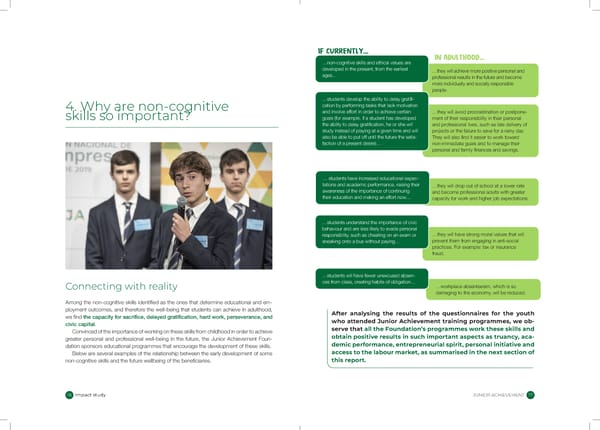IF CURRENTLY… IN ADULTHOOD… …non-cognitive skills and ethical values are developed in the present, from the earliest …they will achieve more positive personal and ages… professional results in the future and become more individually and socially responsible people. …students develop the ability to delay grati - ׂ. Why are non-cognitive cation by performing tasks that lack motivation and involve effort in order to achieve certain …they will avoid procrastination or postpone- skills so important? goals (for example, if a student has developed ment of their responsibility in their personal the ability to delay grati cation, he or she will and professional lives, such as late delivery of study instead of playing at a given time and will projects or the failure to save for a rainy day. also be able to put off until the future the satis- They will also nd it easier to work toward faction of a present desire)… non-immediate goals and to manage their personal and family nances and savings. … students have increased educational expec- tations and academic performance, raising their …they will drop out of school at a lower rate awareness of the importance of continuing and become professional adults with greater their education and making an effort now… capacity for work and higher job expectations. …students understand the importance of civic behaviour and are less likely to evade personal responsibility, such as cheating on an exam or …they will have strong moral values that will sneaking onto a bus without paying… prevent them from engaging in anti- social practices. For example: tax or insurance fraud. …students will have fewer unexcused absen- ces from class, creating habits of obligation… Connecting with reality …workplace absenteeism, which is so damaging to the economy, will be reduced. Among the non-cognitive skills identi ed as the ones that determine educational and em- ployment outcomes, and therefore the well-being that students can achieve in adulthood, After analysing the results of the questionnaires for the youth we nd the capacity for sacri ce, delayed grati cation, hard work, perseverance, and who attended Junior Achievement training programmes, we ob- civic capital. serve that all the Foundation’s programmes work these skills and Convinced of the importance of working on these skills from childhood in order to achieve obtain positive results in such important aspects as truancy, aca- greater personal and professional well-being in the future, the Junior Achievement Foun- demic performance, entrepreneurial spirit, personal initiative and dation sponsors educational programmes that encourage the development of these skills. Below are several examples of the relationship between the early development of some access to the labour market, as summarised in the next section of non-cognitive skills and the future wellbeing of the beneficiaries. this report. 16٪٪٪UǼȬƇƤɅ٪ȷɅɍƫɬ JUNIOR ACHIEVEMENT 17
 Junior Achievement Foundation Page 8 Page 10
Junior Achievement Foundation Page 8 Page 10